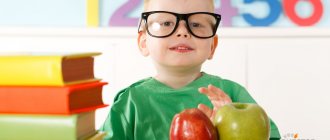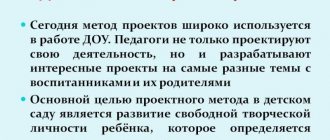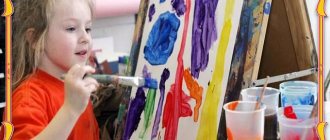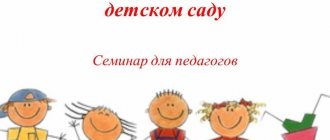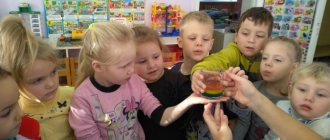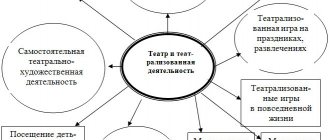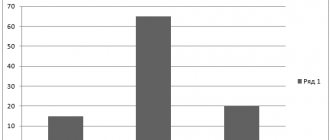Currently, there have been significant changes in sociocultural and economic life in Russia. This means that today’s developing society needs people who are characterized by mobility, constructive thinking, and who are able to make decisions independently and predict the outcome. The fulfillment of this task depends, first of all, on those who stand at the origins of childhood, and therefore on teachers working with preschool children.
It is known that the Federal State Educational Standard for Education pays special attention to supporting children’s initiative and independence in various types of children’s activities, and this is no coincidence. As practice shows, the social situation of children's cognitive development needs to be adjusted. Teachers with teaching experience in most cases have established stereotypes of pedagogical activity; when introducing preschoolers to the outside world, they often resort to the reproductive accumulation of knowledge, skills and abilities; in the educational process, the activity approach and cognitive-research methods are insufficiently used.
Therefore, work on the innovative project “Discover for yourself by playing, experimenting, reasoning” brought us to a qualitatively new level of interaction with preschoolers.
As experience shows, in their practical activities, teachers pay special attention to the cognitive development of children. They develop and implement innovative forms, methods and techniques for teaching preschoolers.
Thus, educators carry out organizational educational activities with children in the form of educational situations in accordance with educational areas. These situations are integrated, problem-based and playful in nature and are aimed at cognitive communication between the teacher and children, the independence of the children and the teacher’s personality-oriented approach. In this case, various types of visualization are actively used: diagrams, models, algorithms.
Modern means of developing cognitive interests make it possible to achieve effectiveness in this work. This is the “Connoisseur” talking pen, with the help of which children analyze information received from “talking books, posters”, if necessary, turn to audio reminder notes, tips, learn to independently obtain new information, reason, draw conclusions, as well as a digital laboratory for preschoolers "Naurasha in the country of Naurandiya". This gaming multimedia product opens up wide additional opportunities for children in research activities. Together with the main character Naurash, a little genius, researcher and designer, they learn to measure temperature, understand the nature of light and sound, and become acquainted with the wonders of the magnetic field.
The development of cognitive interests is also facilitated by the use of the project method, which provides the child with the opportunity to experiment, generalize acquired knowledge, and develop individual abilities. Teachers carry out this work with students in close cooperation with parents. In this case, it is important to involve the family in creating a social situation for the child’s cognitive development during preschool childhood and to assist the child in carrying out search and research activities. We have identified living and inanimate nature, objects and objects of the surrounding world as the leading directions. The themes of the projects are different: “The stove is the heart of a Cossack hut”; "Secrets of the Dolphins"; "Caught a fish"; “Maybe someone survived?”, “Potatoes work wonders!”; “How to store food without a refrigerator?”; “Dangerous viruses”, “Beneficial properties of onions”, etc. Such mini-projects not only introduce children to independent cognitive activity, but also stimulate the manifestation of moral and volitional qualities to achieve cognitive goals.
When organizing work with preschoolers, educators widely use the situation of choice, during which the child has the right to independently choose the means, goals, objectives and conditions of his activities. This helps to form the basis for personal self-expression, initiative and independence of preschoolers. Groups actively use the technique of joint discussion with children about the practical choice of methods and actions, partners for joint completion of a task. At the same time, the main thing remains that the practical choice allows the child to successfully solve the problem set by the teacher, understand and evaluate the connection between the goal and the result obtained.
Preschoolers' keen interest, independence in finding ways to act with material, and ways to solve mental problems are caused by game exercises with Kuizener sticks and Dyenesha blocks. With the help of these manuals, the teacher teaches children to model, encode information, perform logical operations, and learn the algorithmic culture of thinking. Such games are the way not only to successfully mastering the basics of mathematics, but also to the basics of computer science.
In conclusion, it should be noted that the modern approach to the implementation of the tasks set by the Federal State Educational Standard for Education requires teachers to have an active life position, the ability to develop and implement innovative forms, methods and techniques of working with preschoolers.
Currently, there have been significant changes in sociocultural and economic life in Russia. This means that today’s developing society needs people who are characterized by mobility, constructive thinking, and who are able to make decisions independently and predict the outcome. The fulfillment of this task depends, first of all, on those who stand at the origins of childhood, and therefore on teachers working with preschool children.
It is known that the Federal State Educational Standard for Education pays special attention to supporting children’s initiative and independence in various types of children’s activities, and this is no coincidence. As practice shows, the social situation of children's cognitive development needs to be adjusted. Teachers with teaching experience in most cases have established stereotypes of pedagogical activity; when introducing preschoolers to the outside world, they often resort to the reproductive accumulation of knowledge, skills and abilities; in the educational process, the activity approach and cognitive-research methods are insufficiently used.
Therefore, work on the innovative project “Discover for yourself by playing, experimenting, reasoning” brought us to a qualitatively new level of interaction with preschoolers.
As experience shows, in their practical activities, teachers pay special attention to the cognitive development of children. They develop and implement innovative forms, methods and techniques for teaching preschoolers.
Thus, educators carry out organizational educational activities with children in the form of educational situations in accordance with educational areas. These situations are integrated, problem-based and playful in nature and are aimed at cognitive communication between the teacher and children, the independence of the children and the teacher’s personality-oriented approach. In this case, various types of visualization are actively used: diagrams, models, algorithms.
Modern means of developing cognitive interests make it possible to achieve effectiveness in this work. This is the “Connoisseur” talking pen, with the help of which children analyze information received from “talking books, posters”, if necessary, turn to audio reminder notes, tips, learn to independently obtain new information, reason, draw conclusions, as well as a digital laboratory for preschoolers "Naurasha in the country of Naurandiya". This gaming multimedia product opens up wide additional opportunities for children in research activities. Together with the main character Naurash, a little genius, researcher and designer, they learn to measure temperature, understand the nature of light and sound, and become acquainted with the wonders of the magnetic field.
The development of cognitive interests is also facilitated by the use of the project method, which provides the child with the opportunity to experiment, generalize acquired knowledge, and develop individual abilities. Teachers carry out this work with students in close cooperation with parents. In this case, it is important to involve the family in creating a social situation for the child’s cognitive development during preschool childhood and to assist the child in carrying out search and research activities. We have identified living and inanimate nature, objects and objects of the surrounding world as the leading directions. The themes of the projects are different: “The stove is the heart of a Cossack hut”; "Secrets of the Dolphins"; "Caught a fish"; “Maybe someone survived?”, “Potatoes work wonders!”; “How to store food without a refrigerator?”; “Dangerous viruses”, “Beneficial properties of onions”, etc. Such mini-projects not only introduce children to independent cognitive activity, but also stimulate the manifestation of moral and volitional qualities to achieve cognitive goals.
When organizing work with preschoolers, educators widely use the situation of choice, during which the child has the right to independently choose the means, goals, objectives and conditions of his activities. This helps to form the basis for personal self-expression, initiative and independence of preschoolers. Groups actively use the technique of joint discussion with children about the practical choice of methods and actions, partners for joint completion of a task. At the same time, the main thing remains that the practical choice allows the child to successfully solve the problem set by the teacher, understand and evaluate the connection between the goal and the result obtained.
Preschoolers' keen interest, independence in finding ways to act with material, and ways to solve mental problems are caused by game exercises with Kuizener sticks and Dyenesha blocks. With the help of these manuals, the teacher teaches children to model, encode information, perform logical operations, and learn the algorithmic culture of thinking. Such games are the way not only to successfully mastering the basics of mathematics, but also to the basics of computer science.
In conclusion, it should be noted that the modern approach to the implementation of the tasks set by the Federal State Educational Standard for Education requires teachers to have an active life position, the ability to develop and implement innovative forms, methods and techniques of working with preschoolers.
Currently, there have been significant changes in sociocultural and economic life in Russia. This means that today’s developing society needs people who are characterized by mobility, constructive thinking, and who are able to make decisions independently and predict the outcome. The fulfillment of this task depends, first of all, on those who stand at the origins of childhood, and therefore on teachers working with preschool children.
It is known that the Federal State Educational Standard for Education pays special attention to supporting children’s initiative and independence in various types of children’s activities, and this is no coincidence. As practice shows, the social situation of children's cognitive development needs to be adjusted. Teachers with teaching experience in most cases have established stereotypes of pedagogical activity; when introducing preschoolers to the outside world, they often resort to the reproductive accumulation of knowledge, skills and abilities; in the educational process, the activity approach and cognitive-research methods are insufficiently used.
Therefore, work on the innovative project “Discover for yourself by playing, experimenting, reasoning” brought us to a qualitatively new level of interaction with preschoolers.
As experience shows, in their practical activities, teachers pay special attention to the cognitive development of children. They develop and implement innovative forms, methods and techniques for teaching preschoolers.
Thus, educators carry out organizational educational activities with children in the form of educational situations in accordance with educational areas. These situations are integrated, problem-based and playful in nature and are aimed at cognitive communication between the teacher and children, the independence of the children and the teacher’s personality-oriented approach. In this case, various types of visualization are actively used: diagrams, models, algorithms.
Modern means of developing cognitive interests make it possible to achieve effectiveness in this work. This is the “Connoisseur” talking pen, with the help of which children analyze information received from “talking books, posters”, if necessary, turn to audio reminder notes, tips, learn to independently obtain new information, reason, draw conclusions, as well as a digital laboratory for preschoolers "Naurasha in the country of Naurandiya". This gaming multimedia product opens up wide additional opportunities for children in research activities. Together with the main character Naurash, a little genius, researcher and designer, they learn to measure temperature, understand the nature of light and sound, and become acquainted with the wonders of the magnetic field.
The development of cognitive interests is also facilitated by the use of the project method, which provides the child with the opportunity to experiment, generalize acquired knowledge, and develop individual abilities. Teachers carry out this work with students in close cooperation with parents. In this case, it is important to involve the family in creating a social situation for the child’s cognitive development during preschool childhood and to assist the child in carrying out search and research activities. We have identified living and inanimate nature, objects and objects of the surrounding world as the leading directions. The themes of the projects are different: “The stove is the heart of a Cossack hut”; "Secrets of the Dolphins"; "Caught a fish"; “Maybe someone survived?”, “Potatoes work wonders!”; “How to store food without a refrigerator?”; “Dangerous viruses”, “Beneficial properties of onions”, etc. Such mini-projects not only introduce children to independent cognitive activity, but also stimulate the manifestation of moral and volitional qualities to achieve cognitive goals.
When organizing work with preschoolers, educators widely use the situation of choice, during which the child has the right to independently choose the means, goals, objectives and conditions of his activities. This helps to form the basis for personal self-expression, initiative and independence of preschoolers. Groups actively use the technique of joint discussion with children about the practical choice of methods and actions, partners for joint completion of a task. At the same time, the main thing remains that the practical choice allows the child to successfully solve the problem set by the teacher, understand and evaluate the connection between the goal and the result obtained.
Preschoolers' keen interest, independence in finding ways to act with material, and ways to solve mental problems are caused by game exercises with Kuizener sticks and Dyenesha blocks. With the help of these manuals, the teacher teaches children to model, encode information, perform logical operations, and learn the algorithmic culture of thinking. Such games are the way not only to successfully mastering the basics of mathematics, but also to the basics of computer science.
In conclusion, it should be noted that the modern approach to the implementation of the tasks set by the Federal State Educational Standard for Education requires teachers to have an active life position, the ability to develop and implement innovative forms, methods and techniques of working with preschoolers.
Currently, there have been significant changes in sociocultural and economic life in Russia. This means that today’s developing society needs people who are characterized by mobility, constructive thinking, and who are able to make decisions independently and predict the outcome. The fulfillment of this task depends, first of all, on those who stand at the origins of childhood, and therefore on teachers working with preschool children.
It is known that the Federal State Educational Standard for Education pays special attention to supporting children’s initiative and independence in various types of children’s activities, and this is no coincidence. As practice shows, the social situation of children's cognitive development needs to be adjusted. Teachers with teaching experience in most cases have established stereotypes of pedagogical activity; when introducing preschoolers to the outside world, they often resort to the reproductive accumulation of knowledge, skills and abilities; in the educational process, the activity approach and cognitive-research methods are insufficiently used.
Therefore, work on the innovative project “Discover for yourself by playing, experimenting, reasoning” brought us to a qualitatively new level of interaction with preschoolers.
As experience shows, in their practical activities, teachers pay special attention to the cognitive development of children. They develop and implement innovative forms, methods and techniques for teaching preschoolers.
Thus, educators carry out organizational educational activities with children in the form of educational situations in accordance with educational areas. These situations are integrated, problem-based and playful in nature and are aimed at cognitive communication between the teacher and children, the independence of the children and the teacher’s personality-oriented approach. In this case, various types of visualization are actively used: diagrams, models, algorithms.
Modern means of developing cognitive interests make it possible to achieve effectiveness in this work. This is the “Connoisseur” talking pen, with the help of which children analyze information received from “talking books, posters”, if necessary, turn to audio reminder notes, tips, learn to independently obtain new information, reason, draw conclusions, as well as a digital laboratory for preschoolers "Naurasha in the country of Naurandiya". This gaming multimedia product opens up wide additional opportunities for children in research activities. Together with the main character Naurash, a little genius, researcher and designer, they learn to measure temperature, understand the nature of light and sound, and become acquainted with the wonders of the magnetic field.
The development of cognitive interests is also facilitated by the use of the project method, which provides the child with the opportunity to experiment, generalize acquired knowledge, and develop individual abilities. Teachers carry out this work with students in close cooperation with parents. In this case, it is important to involve the family in creating a social situation for the child’s cognitive development during preschool childhood and to assist the child in carrying out search and research activities. We have identified living and inanimate nature, objects and objects of the surrounding world as the leading directions. The themes of the projects are different: “The stove is the heart of a Cossack hut”; "Secrets of the Dolphins"; "Caught a fish"; “Maybe someone survived?”, “Potatoes work wonders!”; “How to store food without a refrigerator?”; “Dangerous viruses”, “Beneficial properties of onions”, etc. Such mini-projects not only introduce children to independent cognitive activity, but also stimulate the manifestation of moral and volitional qualities to achieve cognitive goals.
When organizing work with preschoolers, educators widely use the situation of choice, during which the child has the right to independently choose the means, goals, objectives and conditions of his activities. This helps to form the basis for personal self-expression, initiative and independence of preschoolers. Groups actively use the technique of joint discussion with children about the practical choice of methods and actions, partners for joint completion of a task. At the same time, the main thing remains that the practical choice allows the child to successfully solve the problem set by the teacher, understand and evaluate the connection between the goal and the result obtained.
Preschoolers' keen interest, independence in finding ways to act with material, and ways to solve mental problems are caused by game exercises with Kuizener sticks and Dyenesha blocks. With the help of these manuals, the teacher teaches children to model, encode information, perform logical operations, and learn the algorithmic culture of thinking. Such games are the way not only to successfully mastering the basics of mathematics, but also to the basics of computer science.
In conclusion, it should be noted that the modern approach to the implementation of the tasks set by the Federal State Educational Standard for Education requires teachers to have an active life position, the ability to develop and implement innovative forms, methods and techniques of working with preschoolers.
Currently, there have been significant changes in sociocultural and economic life in Russia. This means that today’s developing society needs people who are characterized by mobility, constructive thinking, and who are able to make decisions independently and predict the outcome. The fulfillment of this task depends, first of all, on those who stand at the origins of childhood, and therefore on teachers working with preschool children.
It is known that the Federal State Educational Standard for Education pays special attention to supporting children’s initiative and independence in various types of children’s activities, and this is no coincidence. As practice shows, the social situation of children's cognitive development needs to be adjusted. Teachers with teaching experience in most cases have established stereotypes of pedagogical activity; when introducing preschoolers to the outside world, they often resort to the reproductive accumulation of knowledge, skills and abilities; in the educational process, the activity approach and cognitive-research methods are insufficiently used.
Therefore, work on the innovative project “Discover for yourself by playing, experimenting, reasoning” brought us to a qualitatively new level of interaction with preschoolers.
As experience shows, in their practical activities, teachers pay special attention to the cognitive development of children. They develop and implement innovative forms, methods and techniques for teaching preschoolers.
Thus, educators carry out organizational educational activities with children in the form of educational situations in accordance with educational areas. These situations are integrated, problem-based and playful in nature and are aimed at cognitive communication between the teacher and children, the independence of the children and the teacher’s personality-oriented approach. In this case, various types of visualization are actively used: diagrams, models, algorithms.
Modern means of developing cognitive interests make it possible to achieve effectiveness in this work. This is the “Connoisseur” talking pen, with the help of which children analyze information received from “talking books, posters”, if necessary, turn to audio reminder notes, tips, learn to independently obtain new information, reason, draw conclusions, as well as a digital laboratory for preschoolers "Naurasha in the country of Naurandiya". This gaming multimedia product opens up wide additional opportunities for children in research activities. Together with the main character Naurash, a little genius, researcher and designer, they learn to measure temperature, understand the nature of light and sound, and become acquainted with the wonders of the magnetic field.
The development of cognitive interests is also facilitated by the use of the project method, which provides the child with the opportunity to experiment, generalize acquired knowledge, and develop individual abilities. Teachers carry out this work with students in close cooperation with parents. In this case, it is important to involve the family in creating a social situation for the child’s cognitive development during preschool childhood and to assist the child in carrying out search and research activities. We have identified living and inanimate nature, objects and objects of the surrounding world as the leading directions. The themes of the projects are different: “The stove is the heart of a Cossack hut”; "Secrets of the Dolphins"; "Caught a fish"; “Maybe someone survived?”, “Potatoes work wonders!”; “How to store food without a refrigerator?”; “Dangerous viruses”, “Beneficial properties of onions”, etc. Such mini-projects not only introduce children to independent cognitive activity, but also stimulate the manifestation of moral and volitional qualities to achieve cognitive goals.
When organizing work with preschoolers, educators widely use the situation of choice, during which the child has the right to independently choose the means, goals, objectives and conditions of his activities. This helps to form the basis for personal self-expression, initiative and independence of preschoolers. Groups actively use the technique of joint discussion with children about the practical choice of methods and actions, partners for joint completion of a task. At the same time, the main thing remains that the practical choice allows the child to successfully solve the problem set by the teacher, understand and evaluate the connection between the goal and the result obtained.
Preschoolers' keen interest, independence in finding ways to act with material, and ways to solve mental problems are caused by game exercises with Kuizener sticks and Dyenesha blocks. With the help of these manuals, the teacher teaches children to model, encode information, perform logical operations, and learn the algorithmic culture of thinking. Such games are the way not only to successfully mastering the basics of mathematics, but also to the basics of computer science.
In conclusion, it should be noted that the modern approach to the implementation of the tasks set by the Federal State Educational Standard for Education requires teachers to have an active life position, the ability to develop and implement innovative forms, methods and techniques of working with preschoolers.
Fundamentals of Cognitive Development
One of the most important tasks of teachers and educators is teaching children to navigate large information flows coming from different sources. Moreover, in addition to assimilation and structuring of information, the child must have the ability to search for the necessary data.
Cognitive development includes:
- formation of motivation for knowledge;
- organization of cognitive actions;
- development of creative imagination and activity;
- the formation of self-awareness;
- formation of initial ideas about oneself and other people.
Experimentation
It is a form of research activity whose goal is to transform things and processes. Experimentation can be considered as one of the best methods of cognitive activity of preschoolers. Experiments are fun activities that develop curiosity, initiative, creative thinking and independence.
In the process of experimentation, all the child’s senses are involved, which ensures better assimilation, understanding, comprehension and memorization of information. The child’s active participation in the educational process contributes to faster and more intensive development of his cognitive activity and abilities.
